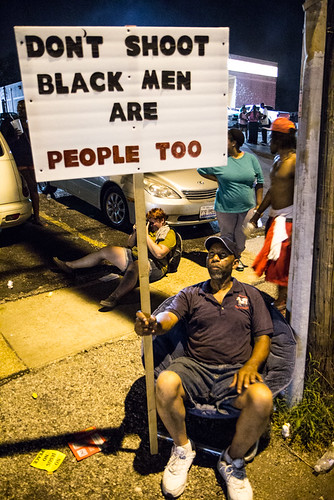On July 25, 2014, the office of a white prosecutor in St. Louis County, Missouri charged a black policeman named Dawon Gore with felony assault, according to an online article by a local CBS affiliate, for “striking a MetroLink passenger on the hand with his expandable baton following an argument.” The officer was “jailed on a $3,500, cash-only bond.”
On Tuesday, November 24, 2014, the same white prosecutor, Robert McColloch, announced a decision by a 75% white grand jury not to indict a white policeman for shooting to death a young black man named Michael Brown.
Unlike Officer Gore, Officer Wilson never set foot in jail after inflicting violence on a citizen. He sat at home on paid administrative leave, enjoying a financial perk his black colleague went without. And now, while Michael Brown lies in his grave with bullet wounds riddling his lifeless body, Darren Wilson remains a free man.

McCulloch described his “sworn duty and that of the grand jury,” in lofty terms during Tuesday’s 20 minute announcement, as millions of black Americans (and not a few white ones, including me) shook their heads in disgust with the realization that Darren Wilson would not be sitting at a defendant’s table in Missouri criminal court. Their duty was, the white prosecutor said, “to seek justice and not simply obtain an indictment or conviction.”
Obtaining indictments against police who shoot civilians doesn’t seem to be his strong suit.1 According to a detailed and even-handed article by Heather Cole back in September, his “office has brought to grand juries at least five cases over six deaths at the hands of police,” and they all turned out the way Wilson’s case did: No true bill, game over.
Ms. Cole took a detailed look at McCulloch’s prosecution history and made some interesting findings. The following three bullet points are quoted directly from her article two months ago:
-
“McCulloch’s office has prosecuted at least 33 police officers or former police officers, according to a list provided by McCulloch’s executive assistant, Edward Magee. McCulloch has been prosecutor since 1991.”
-
“McCulloch’s office also has at least four times presented information to a grand jury about police officers who shot suspects to death while on the job, according to a search of St. Louis Post-Dispatch archives. None of those grand juries indicted the officers.”
-
“After a grand jury and a federal investigation exonerated a federal agent and a police officer in the fatal 2000 shooting of two black men during an attempted drug arrest, McCulloch called the shooting victims ‘bums.’” 2
“There is no question that Darren Wilson caused the death of Michael Brown by shooting him,” McCulloch said in his statement, which sounded more like a defense attorney’s closing argument than a prosecutor’s announcement of a failed bid for indictment. But, he went on, “the inquiry does not end there. The law allows a law enforcement officer to use deadly force in certain situations.” And according to his grand jury’s decision, this was one of them: “They determined that no probable cause exists to file any charge against Officer Wilson.” Not even probable cause! This is not the much higher courtroom standard of guilt beyond a reasonable doubt.

Never mind these inconvenient bits of evidence, all supposedly given due consideration by the grand jury: Eleven witnesses said Mr. Brown was running away from Officer Wilson when he was being fired upon, as opposed to just three who said he wasn’t.3 Twelve of them said Mr. Brown put his hands in the air when he was being shot at, as opposed to two who said he didn’t.4 Five witnesses said Officer Wilson continued firing, repeatedly, at Mr. Brown while he was on the ground, as opposed to four who said he didn’t.5
These figures (and some of my wording about them) are from a very informative and disturbing table of witness interviews composed by Laura Santhanam and Vanessa Dennis for PBS Newshour. Take a look; it’s important.
One person listed as a witness in that table isn’t included in these tallies–Darren Wilson. Why not? Because his testimony was self-serving and unchallenged, his very appearance before the grand jury a gift from an easygoing prosecutor. As Justice Scalia–no friend of liberal causes–wrote for the majority in United States v. Williams, “[N]either in this country nor in England has the suspect under investigation by the grand jury ever been thought to have a right to testify, or to have exculpatory evidence presented.” That’s because the grand jury’s function is “only to examine ‘upon what foundation [the charge] is made’ by the prosecutor,” rather than inquiring “‘upon what foundation [the charge may be] denied,’ or otherwise to try the suspect’s defenses.”
And why wasn’t Wilson challenged? Because Bob McCulloch, the person who was supposed to do that job in a trial after obtaining the indictment he was ostensibly seeking, didn’t bother to do so when allowing Wilson to appear in this grand jury proceeding, long and extensive as it was. That’s certainly the impression attorney and media legal analyst Lisa Bloom gave in various fiery tweets she launched into Tuesday night’s angry darkness.
“So many missed opportunities for cross examination of Wilson,” she wrote in one. There should “have been a grueling session, not the tea party the transcript shows.”
In another, she said, “Maybe we should take up a collection to teach the Ferguson prosecutors how to cross examine an adverse witness. Step 1: ask tough questions.”
And then there was this scathing summary she offered about the way McCulloch did (or didn’t do) his job: “An attorney who does not aggressively cross-examine the target of an investigation is an attorney who does not want to get to the truth.”
There is a lot of suspicion about McCulloch not wanting much truth when it came to the way the real witnesses were treated, too. The New York Daily News (admittedly, not law review material) points out that one of them who “testified he saw Brown on his knees with his hands up” had been “ridiculed by prosecutors”:
“Basically just about everything that you said on Aug. 13, and much of what you said today isn’t consistent with the physical evidence that we have in this case, OK,” the prosecutor said.

In the view of Ronald Kuby, a defense attorney the News interviewed for their article, that “wildly improper commentary encapsulates what the prosecutors were doing. Steering the grand jury not to indict.” 6
Shaun King asked his 103,000 Twitter followers to think about this on Tuesday: “Have you ever, in your life, seen a prosecutor more proud that he did not get an indictment than McCulloch was tonight?”
This discussion would be incomplete without a mention of the physical evidence–two autopsy reports that apparently match up with Wilson’s testimony, self-serving and unchallenged though it was.7 I’ll be candid here, in a highly charged subject area where candor seems to be in short supply: It speaks to my own sympathies toward the black community and against the prosecutor that I did not include it in the original version of this essay until a friend on Facebook pointed it out.
So here we go, briefly, because it’s late. If I had been inclined to support Wilson’s point of view from the outset, I probably would have focused on this part and the essay would have taken on a different tone. We are subjective creatures, all of us. I try to be honest about that mental limitation, at least, and work to overcome it.
The St. Louis County Medical Examiner’s report is currently accessible here, and a private one performed for Mr. Brown’s family is here. I’ll let the analysis from two media sources do the talking here. The first is by Eyder Peralta and Krishnadev Calamur of National Public Radio, not exactly a hotbed of reactionary racism. Peralta and Calamur came up with “two findings of major importance” in the autopsy reports.
-
“First, the autopsy found that Michael Brown was never shot in the back, as some early witnesses claimed.”
-
“Second, they found Brown’s blood inside the police car and on Wilson’s gun. This implies that there was close-range contact as Wilson alleges.”
They also note “the photographs taken of Wilson on the day of the confrontation” and the diagnosis doctors gave him of just having a bruise. That, they say, “seems to cast some doubt on Wilson’s testimony about the intensity of the confrontation.” 8
The other media analysis I came across in my late-stage rebalancing effort was an article by Paul G. Cassell, a law professor at the University of Utah. “The physical evidence,” he concludes, “gave no reason to doubt Wilson’s testimony.” Cassell reviewed the reports and the Medical Examiner’s testimony and says
the ME thought that the soot would be indicative of the gun that fired the bullet causing the wound having been only 6 to 9 inches away. The soot was consistent with that discharged from a gun. The official report from the Office of Medical Examiner later confirmed that “the previously described particles of foreign particulate matter are consistent with products that are discharged from the barrel of a firearm.”
The significance of this wound and related physical evidence, says Cassell,
is that it places Brown’s right hand within 6 to 9 inches of the barrel of Wilson’s firearm. This physical evidence is thus quite consistent with Wilson’s testimony that Brown was trying to get hold of Wilson’s weapon, creating a fear in Wilson that he was going to get shot. It also creates a problem for those who view Brown as having been somehow accosted by Wilson and was just trying to escape.9
Reasonable doubt? Perhaps so. Does it make all that witness evidence just evaporate and eliminate probable cause for a trial that could get this material examined, under proper cross-examination? Here’s Lisa Bloom again, in a few tweets she sent on November 27, after going over Wilson’s testimony a second time:
If Mike Brown twisted Wilson’s gun-holding hand backwards into Wilson’s pelvis, why doesn’t Wilson have a wrist injury or even redness?
Prosecutors never asked Darren Wilson how Mike Brown “grabbed” his gun without leaving a single fingerprint.
“What do I do not to get beaten inside my car,” Darren Wilson said he thought. Yet prosecutors never asked why he didn’t hit the gas.
And does the physical evidence get McColloch off the hook for the way he conducted this whole exercise, seeming to act more as Wilson’s defense attorney than the people’s prosecutor? It doesn’t seem so to me, even as a non-attorney with my admitted biases.
Remember, Michael Brown’s family had no effective advocate during this process, nobody challenging Wilson and actually accusing him of a crime. That was the prosecution’s job, and a lot of people with real expertise are saying he didn’t do it. There still seems to be an ugly underside of the whole mess, and a valid reason for a lot of people to be angry. Especially ones who look more like Michael Brown and Dawon Gore than Robert McColloch or Darren Wilson or the vast majority of police in their neighborhoods, and have seen justice denied time after time.
The American Bar Association’s standards for prosecutors refer to the role as “an administrator of justice, an advocate, and an officer of the court.” 10 Mr. McCulloch didn’t seem too focused on the second part of that. You know, the bit about advocating for the citizens he serves, most of whom are black and would presumably prefer not to have cops get away with shooting at them.

He began his announcement with a criticism not of the guy he was supposed to be prosecuting, but of social media for “accounts filled with speculation and little if any solid, accurate information.” His unusually protracted grand jury hearing–25 days!–ended without even a recommendation that charges be filed.
According to Eric Citron, however, this was “not your typical grand jury investigation.” That was the subtitle of his blog posting Tuesday night discussing how United States v. Williams applied to this case. The grand jury process “protected Wilson because the prosecutor was willing to let it,” he wrote. He wasn’t willing to come out and say for certain that “this is a case about prosecutorial or institutional bias in which Wilson was treated far too well.”
Perhaps it was, he said, but maybe “it is a case about reviving a much more robust role for the grand jury, so that others get the same legal process on display this week.” Yeah, maybe so. And perhaps the Koch brothers will start voting Democrat.
But there’s no avoiding the barbs in the point Citron made earlier in his essay. The prosecutor would have done things differently if he wanted things to go differently:
[W]hen a prosecutor really wants an indictment, you would not expect the grand jury process to look anything like what happened in Darren Wilson’s case. The prosecutor would have no obligation to put forward the conflicting eyewitness testimony, or introduce pictures of Officer Wilson’s injuries–although grand jury members could ask for them if they somehow knew they existed. Instead, the prosecutor could put forward only the first few witnesses corroborating his own theory, along with the evidence that Wilson fired ten shots from a substantial distance away.
Former prosecutor Charlie Reece was not so reserved: “I can tell you the way that the prosecutor handled this case is a miscarriage of justice. This is just horrible.” 11
Is there really any question about why people protest when the system has failed them, why a few (and it only takes a few) in the thick of things might start fires and overturn vehicles? 12
“Why protest?” tweeted Deray Mckesson on Tuesday night as it was happening. “Because we refuse to be scared into silence. Because we refuse to drown in a pool of our tears.” Drbrowne tweeted, “Don’t [you] dare package our fears and pains, sell them back to us in exchange for rage and tears, then label us irrational, uncivilized, savage.”
And from Stephanie came this tweet with the #BlackLivesMatter hashtag: “My God what must the ’60s have been like?! Fear. Injustice. Brutality. Racial divide. Sounds a bit like 2014.” Unfortunately, it sounds like the nation W.E.B. Du Bois wrote about 111 ago, too, one that had “not yet found peace from its sins; the freedman has not yet found in freedom his promised land.” 13
Notes
-
In fairness, it appears that grand juries rarely decide to indict police officers, in any event. ↩
-
Heather Cole, “Background check: Looking at McCulloch’s prosecution history.” Missouri Lawyers Weekly, September 8, 2014. molawyersmedia.com/2014/09/08/background-check-looking-at-mccullochs-prosecution-history ↩
-
Witnesses 12, 16, 25, 30, 37, 42, 43, 45, 46, 57, and 64 said Brown was running away when being fired upon. Witnesses 34, 44, and 48 said he wasn’t. Witness 14 gave inconsistent answers between interview No. 1 and No. 2. PBS Newshour table, column 8. ↩
-
Witnesses 14, 16, 22, 35, 37, 41, 42, 44, 45, 46, 48, and 64 said his hands were up; witnesses 10 and 30 said they weren’t. Table, column 10. ↩
-
Witnesses 37, 41, 42, 45, and 46 said Wilson kept firing with Brown on the ground; witnesses 12, 14, 16, and 44 said he didn’t. Table, column 5. ↩
-
“MICHAEL BROWN SHOOTING EXPLAINED: Step-by-step review of the confrontation between Ferguson cop Darren Wilson and the unarmed teen,” New York Daily News, Nov. 26, 2014 (nydn.us/1ygARm6). ↩
-
Update, December 3: Also worth noting is that, apparently, “the sworn testimony of Wilson’s squad supervisor directly contradicts” Wilson’s about seeing Michael Brown and his friend Dorian Johnson and realizing “they matched the description of two suspects wanted in connection with the robbery of nearby Ferguson Market.” From Laura Collins’ Daily Mail article of December 2, 2014. The Mail is of course not law review material, either, but the article makes some great points and offers a link to the pertinent volume of grand jury testimony. ↩
-
Eyder Peralta and Krishnadev Calamur, “Ferguson Documents: How The Grand Jury Reached A Decision.” The Two-Way, NPR, npr.org/blogs/thetwo-way/2014/11/25/366507379/ferguson-docs-how-the-grand-jury-reached-a-decision. Nov. 25, 2014. ↩
-
Paul G. Cassell, “The physical evidence in the Michael Brown case supported the officer.” Washington Post, washingtonpost.com/news/volokh-conspiracy/wp/2014/11/28/the-physical-evidence-in-the-michael-brown-case-supported-the-officer. Nov. 28, 2014. I’ve omitted Cassell’s meticulous page:line references to the transcripts in my quotations. ↩
-
From the ABA’s website. Note the disclaimer they put right up front there: “These standards are intended to be used as a guide to professional conduct and performance. They are not intended to be used as criteria for the judicial evaluation of alleged misconduct of the prosecutor to determine the validity of a conviction.” Also, note my own important disclaimer: I am not a lawyer, and am certainly in no position to evaluate the legal ethics of Robert McCulloch’s conduct. But, speaking purely as an ordinary Joe Citizen sifting through media reports, something sure smells funny about all this to me. ↩
-
twitter.com/CharlieReece/status/537072172695834624. See also “The Ferguson Lie” on Scott H. Greenfield’s Simple Justice blog. “We were played,” he writes. “McCulloch’s lengthy spiel before announcing ‘no true bill’ was to spread the lie.” ↩
-
Update, December 3: A grand jury in New York has declined to indict Daniel Pantaleo for the choking death of Eric Garner. ↩
-
W.E.B. Du Bois, The Souls of Black Folk (1903), p. 8. (Kindle ed.) ↩












